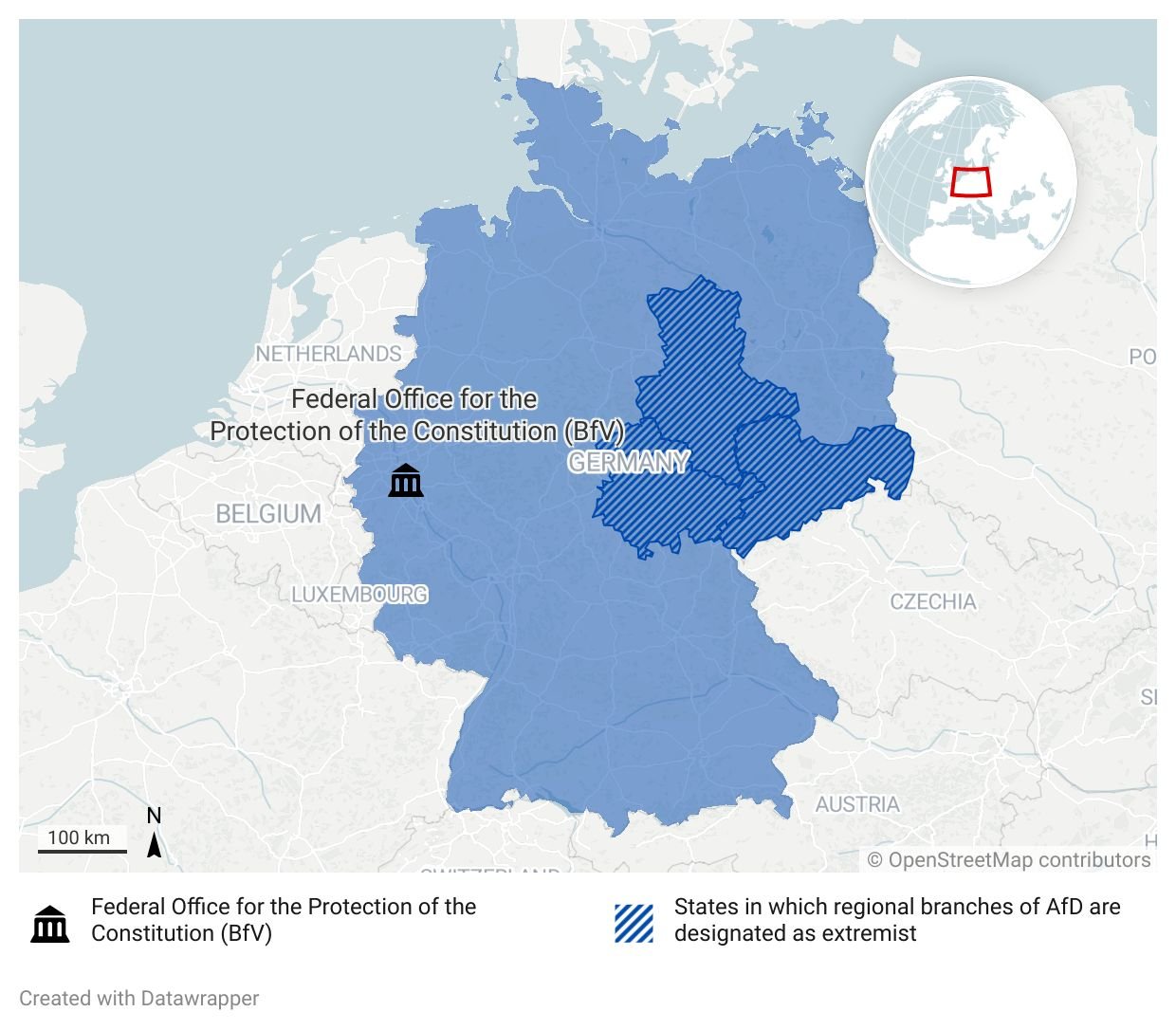AfD’s Extremism Designation: What is the Future of Germany’s Largest Opposition Party?
Milica Starinac | 28 May 2025
Summary
Alternative für Deutschland (AfD), which has become the largest opposition party in the latest German parliamentary elections, has been designated as “confirmed right-wing extremist” by the German intelligence agency.
The right-wing party, which has previously been regarded as a “suspected case” of right-wing extremism due to its racist, xenophobic and Islamophobic rhetoric, appealed the decision to a Cologne-based court, which put the designation on hold until the court ruling.
The court is likely to uphold the BfV’s extremism designation of the AfD, possibly triggering legal and political efforts to ban the party.
AfD, the second largest party in the Bundestag, was designated as “confirmed right-wing extremist” by the German domestic intelligence agency, Federal Office for the Protection of the Constitution (BfV). BfV’s decision on 2 May 2025 underscored that the AfD’s “xenophobic, anti-minority, Islamophobic” rhetoric is among the reasons for the designation. Essentially, this means that BfV considers the party to be a threat to Germany’s constitutional order. AfD’s co-chairs Alice Weidel and Tino Chrupalla accused the outgoing German government of trying to discredit and criminalise the party, describing the decision as “politically motivated”. They filed a lawsuit with the Administrative Court in Cologne, where the intelligence agency is based, resulting in the suspension of BfV’s designation until the impending verdict. However, this should not be seen as a withdrawal of decision and a victory for AfD — the court’s decision is still pending and prior records show AfD is not favoured by the judiciary system against BfV.
Was BfV’s decision to classify the largest opposition party in Germany a watershed moment? Yes, however, various AfD branches have been designated as extremist before. However, this was the first time that a parliamentary party was designated as “confirmed right-wing extremist”. It would allow the BfV to lower the threshold for surveillance and employ informants from within AfD. Most importantly, the designation of the federal branch of AfD as extremist opens the door for banning the party altogether — an initiative which can come from any of the four constitutional bodies — the Bundestag, Bundesrat, federal government or the Federal constitutional court. Still, the party has been previously classified as a “suspected case” of right-wing extremism, allowing the agency to employ surveillance methods, albeit with stricter judicial oversight.
3 regional branches of AfD, in the eastern states of Thuringia, Saxony and Saxony-Anhalt, have already been designated as extremist by the BfV. Young Alternative (JA), the youth wing of AfD, was branded extremist in 2023, a decision which was similarly challenged by the party in Cologne court, which ruled in BfV’s favour. This prompted AfD to dissolve its youth organisation in April 202,5 following significant electoral gains, in a tactical move which can be seen as damage control. Should the court ruling uphold BfV’s standpoint, the federal branch of AfD may come under the same possibility.
While some German politicians support the decision and call for a ban of AfD, others — such as the new chancellor Friedrich Merz — warn that banning the party will not solve the underlying issues which prompted 10 million German citizens to vote for it. His government is expected to face high pressure from both sides should the court ruling open the possibility for initiating a ban. While nearly half German citizens support the ban of AfD, such a move will almost certainly trigger backlash from the party’s growing base, particularly considering the latest polls that show AfD is as popular as the ruling CDU/CSU. It could fuel AfD’s anti-establishment rhetoric and allow it to mobilise support in protests or even riots targeted against the government and the minorities – possibly similar to one in Chemnitz in 2018.
The controversial party, which the 1000-page BfV report found to be “inciting irrational fears and hostility”, received support from Donald Trump’s administration. The BfV report concluded that “ethnicity-and ancestry-based conception of the people that predominates within the party is not compatible with the free democratic order.” The most important question that remains following BfV’s decision is whether it will contribute to curbing the far-right threat, or will it feed into the party’s anti-establishment narratives and cause a surge in support.
Mika Baumeister/Unsplash
Forecast
Short-term (Now - 3 months)
The Cologne administrative court is likely to uphold BfV’s decision to designate AfD as confirmed right-wing extremist, based on its previous decisions in related cases and comprehensive evidence gathered by the agency.
The AfD is highly unlikely to be allowed to chair any parliamentary committees in the Bundestag, as Bundestag Vice-President said following the extremism designation.
Medium-term (3-12 months)
There is a realistic possibility that Merz’s federal government or the Bundestag will initiate a motion to ban AfD on the extremism grounds, should the court’s decision be positive.
AfD is likely to appeal the court’s decision and employ all legal instruments to challenge the decision and drag the case.
Long-term (>1 year)
There is a realistic possibility that the extremism designation and possible initiation of ban proceedings will exacerbate internal party differences and cause the party to split into a moderate and extreme wing.



